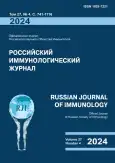Нарушения в синтезе цитокинов у женщин с миомой матки
- Авторы: Исанбаева Л.М.1, Мусаходжаева Д.А.2, Нарзуллоева Н.С.3
-
Учреждения:
- Центр развития профессиональных квалификаций медицинских работников
- Институт иммунологии и геномики человека академии наук Республики Узбекистан
- Бухарский государственный медицинский университет
- Выпуск: Том 27, № 4 (2024)
- Страницы: 871-876
- Раздел: КРАТКИЕ СООБЩЕНИЯ
- URL: https://bakhtiniada.ru/1028-7221/article/view/267864
- DOI: https://doi.org/10.46235/1028-7221-16955-DIC
- ID: 267864
Цитировать
Полный текст
Аннотация
В структуре гинекологических заболеваний миома матки занимает «почетное» второе место после воспалительных процессов половых органов, а удельный вес ее достигает 40%. Миома матки – доброкачественная моноклональная опухоль, которая развивается из одной аномальной гладкомышечной клетки миометрия, имеющей в результате мутации способность к нерегулируемому росту. К распространенным симптомам заболевания относятся дискомфорт или боль в области таза, чрезмерные маточные кровотечения, вторичная анемия, бесплодие, дисфункция кишечника и мочевого пузыря. Миома матки способна негативно влиять на общее состояние женщины, вызывая гормональные, вегетососудистые и психоэмоциональные расстройства. При этом около 80% пациенток с миомой матки подвергаются радикальному оперативному лечению. Механизмы развития и роста этой доброкачественной опухоли окончательно не установлены и остаются дискуссионными. В настоящее время обсуждается роль в патогенезе миомы иммунных нарушений. Доказано, что рост миомы сопровождается ослаблением иммунной защиты на фоне повышения уровня провоспалительных цитокинов, которые являются регуляторами процессов пролиферации и апоптоза, медиаторами действия половых стероидов.
Целью исследования явилось изучение уровня некоторых провоспалительных цитокинов (IL-1β, IL-2, TGF-β2 и МСР-1) в сыворотке крови у женщин репродуктивного возраста с миомой матки в зависимости от размеров и характера роста опухоли.
Представлен сравнительный анализ результатов обследования 123 женщин с миомой матки, которые составили 2 группы: 1-я группа – 65 женщин с простой ММ и 2-я группа – 58 женщин с быстрорастущей ММ. Обследование включало комплексное клинико-лабораторное исследование. Уровень цитокинов (IL-1β, IL-2, TGF-β2, MCP-1) в сыворотке крови оценивали методом ИФА. Было выявлено, что у пациенток репродуктивного возраста с миомой матки наблюдается повышение уровня IL-1β, TGF-β2 и МСР-1. У женщин с быстрорастущей ММ эти изменения более выражены. Концентрация IL-2 снижена у всех женщин с ММ вне зависимости от размеров и характера роста опухоли.
Установлено, что увеличение размеров миоматозных узлов сопровождается нарастанием иммунного дисбаланса: отмечается повышение уровней провоспалительных цитокинов (IL-1β, TGF-β2, MCP-1) на фоне сниженного содержания лимфокина IL-2, что нами расценено как возможные звенья патогенеза миомы матки. Выраженный дефицит IL-2 в сыворотке крови на фоне резкого повышения концентрации TGF-β2 и MCP-1 в крови женщин с миомой матки может рассматриваться как негативный критерий при прогнозе прогрессии заболевания и использоваться в качестве дополнительного прогностического маркера опухолевого роста.
Ключевые слова
Полный текст
Открыть статью на сайте журналаОб авторах
Л. М. Исанбаева
Центр развития профессиональных квалификаций медицинских работников
Email: dilym@mail.ru
д.м.н., доцент кафедры
Узбекистан, г. ТашкентД. А. Мусаходжаева
Институт иммунологии и геномики человека академии наук Республики Узбекистан
Автор, ответственный за переписку.
Email: dilym@mail.ru
д.м.н., профессор, заведующая лабораторией репродуктивной иммунологии
Узбекистан, г. ТашкентН. С. Нарзуллоева
Бухарский государственный медицинский университет
Email: dilym@mail.ru
к.б.н., доцент кафедры
Узбекистан, г. БухараСписок литературы
- Буянова С.Н., Юдина Н.В., Гукасян С.А. Современные аспекты роста миомы матки // Российский вестник акушера-гинеколога, 2012. Т. 12, № 4. С. 42-48. [Buyanova S.N., Yudina N.V., Gukasyan S.A. Modern aspects of the growth of uterine fibroids. Rossiyskiy vestnik akushera-ginekologa = Russian Bulletin of Obstetrician-Gynecologist, 2012, Vol. 12, no. 4, pp. 42-48. (In Russ.)]
- Каторкина Е.С. Шатунова Е.П. Современные аспекты этиологии и патогенеза миомы матки // Наука и инновации в медицине, 2017. № 1 (5). С. 6-12. [Katorkina E.S. Shatunova E.P. Modern aspects of the etiology and pathogenesis of uterine fibroids. Nauka i innovatsii v meditsine = Science and Innovation in Medicine, 2017, no. 1 (5), pp. 6-12. (In Russ.)]
- Кетлинский С.А., Симбирцев А.С. Цитокины. СПб.: Фолиант, 2008. 552 с. [Ketlinsky S.A., Simbirtsev A.S. Cytokines]. St. Petersburg: Foliant, 2008. 552 p.
- Лицова А.О., Малышкина А.И., Воронин Д.Н. Особенности системной и местной продукции цитокинов у женщин с миомой матки разной скорости роста // Российский иммунологический журнал, 2012. Т. 6 (14), № 2 (1). С. 105-106. [Litsova A.O., Malyshkina A.I., Voronin D.N. Features of systemic and local production of cytokines in women with uterine fibroids of different growth rates. Rossiyskiy immunologicheskiy zhurnal = Russian Journal of Immunology, 2012, Vol. 6 (14), no. 2 (1), pp. 105-106. (In Russ.)]
- Хворостухина Н.Ф., Островская А.Е., Новичков Д.А., Степанова Н.Н. Цитокиновый профиль при осложнениях гормональной терапии миомы матки // Медицинская иммунология, 2017, Т. 19, № 6. C. 739-748. [Khvorostukhina N.F., Ostrovskaya A.E., Novichkov D.A., Stepanova N.N. Cytokine profile in complications of hormone therapy for uterine fibroids. Meditsinskaya immunologiya = Medical Immunology (Russia), 2017, Vol. 19, no. 6, pp. 739-748. doi: 10.15789/1563-0625-2017-6-739-748.
- Тихомиров А.Л., Лубнин Д.М. Миома матки. М.: Агентство медицинской информации, 2006. 176 c. [Tikhomirov A.L., Lubnin D.M. Uterine fibroids. Moscow: Medical Information Agency, 2006. 176 p.
- Ярилин А.А. Иммунология: Учебник. Москва: ГЭОТАР-Медиа. 2010. [Yarilin A.A. Immunology: Textbook]. Moscow: GEOTAR-Media. 2010. 752 р.
- Ciavattini A., Di Giuseppe J., Stortoni P., Montik N., Giannubilo S.R., Litta P., Islam M.S., Tranquilli A.L., Reis F.M., Ciarmela P. Uterine fibroids: pathogenesis and interactions with endometrium and endomyometrial junction. Obstet. Gynecol. Int., 2013, Vol. 2013, 173184. doi: 10.1155/2013/173184.
- Ciarmela P., Islam M.S., Reis F.M., Gray P.C., Bloise E., Petraglia F., Vale W., Castellucci M. Growth factors and myometrium: biological effects in uterine fibroid and possible clinical implications. Hum. Reprod. Update, 2011, Vol. 17, no. 6, pp. 772-790.
- di Tommaso S., Massari S., Malvasi A., Bozzetti M.P., Tinelli A. Gene expression analysis reveals an angiogenic profile in uterine leiomyoma pseudocapsule. Mol. Hum. Reprod., 2013, Vol. 19, no. 6, pp. 380-387.
Дополнительные файлы











